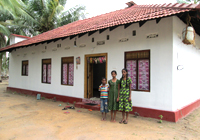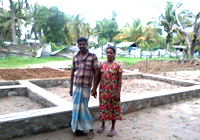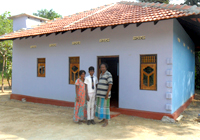
February 2013, Northern Province, Sri Lanka: Less than six months after the commencement of the Indian Housing Project in the North of Sri Lanka, several home owners have already completed reconstructing their houses. With technical support from UN-Habitat, Mr. V. Elumalaipillai from Killinochchi and Mr.Srikanatha Kandiah from Mullaitivu district are among the eight beneficiaries to successfully complete their houses in January 2013. In total, 40,000 houses will be constructed under this Phase of the Indian Housing Project in the districts of Jaffna, Killinochchi, Mannar, Mullaitivu and Killinochchi using a "home owner driven" process of reconstruction.

Mr. Srikantha Kandiah from Mullaitivu district is a skilled mason. Following the conclusion of the conflict, he and his wife returned to their village of Suthathirapuram colony with their three children. Being one of the first beneficiaries selected for housing support by the Indian Housing Project, the Kandiah family commenced construction on 26th October 2012. As Srikantha was a skilled mason, most of the construction was undertaken by him which helped the family optimize the financial grant of Rs.550,000. The house was completed on 15th January 2013 and the family has now moved in to their brand new home.
Mr. V Elumalaipillai was selected as a beneficiary in August 2012 to reconstruct his war damaged house. He received his first grant payment in September 2012 and commenced construction work with the assistance of the UN-Habitat field team, who helped the family select a suitable house plan and provided advice on the foundation work and building materials. Mr.Elumalaipillai and his wife Thavamanidevi were jointly responsible for the planning, organizing and construction of their house. The family also provided unskilled labour support which assisted with saving on labour costs.

Expressing her appreciation to the Indian Government, Thavamanidevi stated: "We desperately wanted a permanent house to live in. With the destruction caused by the war it was never within our reach. This was an opportunity for us to get involved in, provide maximum contribution and complete the house in a very short time. I thank the Indian Government for providing this opportunity and UN-Habitat for supporting and encouraging us to complete the house".
The Indian Housing Project is funded by the Government of India and implemented through a Memorandum of Understanding (MoU) with the Government of Sri Lanka (GOSL). Four Implementing Agencies (IAs) have been selected for this project, which is being executed in the Northern and Eastern Provinces of Sri Lanka. UN-Habitat is one of the Implementing agencies together with the International Federation for the Red Cross and Red Crescent Societies (IFRC) in partnership with Sri Lanka Red Cross, the National Housing Development Authority (NHDA) of the Government of Sri Lanka and Habitat for Humanity. The 36 month project will be implemented from mid 2012 until mid 2015. UN-Habitat is implementing the reconstruction and repair of 16,800 houses in the districts of Mullaitivu, Killinochchi and Jaffna.
Beneficiaries under this project are selected through a transparent process on the basis of clearly defined and objective criteria. These beneficiaries undertake the construction or repair of their houses with necessary technical assistance and support provided by the IAs. Funds are released directly by the High Commission of India into bank accounts of beneficiaries based on certification of progress of work. Cash grants of Rs.550,000 for full reconstruction of a house and up to Rs. 250,000 for repairs are provided to the beneficiaries.
Since the official launch of the project in October 2012, 3,622 beneficiaries in the project locations implemented by UN-Habitat have received the first installment of the grant and commenced the construction of their houses. To date, 952 have completed their foundations, while 153 beneficiaries have completed construction of their houses up to gable level. Eight beneficiaries have completed construction and have moved into their new homes.







